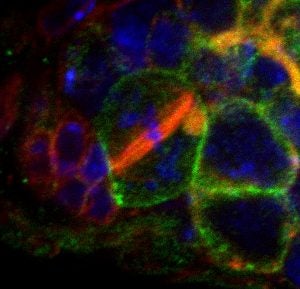Harriot College Biologist to Receive 5-Year Achievement Award
Dr. Elizabeth Ables, associate professor of biology and Board of Governors Distinguished Professor for Teaching, will receive a 5-Year Achievement for Excellence in Research and Creative Activity Award at the university’s annual Research and Scholarships Award ceremony later this spring.
The 5-Year Achievement award is one of the most prestigious at East Carolina University. It rewards originality and excellence in research and creative activities performed while contributing to the academic functions of ECU. Awardees, at any rank, must have taught at ECU for at least five years, have demonstrated sustained, high-quality research and creative activity, and been involved in research at ECU during the academic year in which they are selected.
“There are so many of my colleagues worthy of this award, so I’m honored to have been chosen from among that prestigious group,” Ables said.
Ables research interests include studying the genetics and cell biology controlling the production of oocytes, also known as eggs. Oocytes are the specialized cells necessary for many species, including humans, to produce new life.
She said a real conundrum in fertility research is that human females produce a limited number of oocytes, and this oocyte reserve is depleted quickly as women age. In contrast, she said other species have a specialized pool of stem cells that allow the female to continue to make oocytes for most of their adult life. Ables poses the questions, What is different about the way oocytes are created in those species, and how might we harness some of that genetic power to extend fertility or oocyte quality in humans?
“My research uses the fruit fly, a powerhouse experimental model, to investigate the genes that control stem cell maintenance and oocyte production,” Ables said. “My students use a variety of strains of fruit flies — in which specific genes are mutated — and high-resolution microscopy to visualize the stem cells inside the fly ovary. This is my favorite aspect of my research. I love making beautiful pictures of cells.”

A germline stem cell (outlined in green) during the process of cell division. The mitotic spindle is visualized in red and DNA is visualized in blue.
(Image by senior biology major Anna Williams – Ables lab)
In addition to performing research that she loves, Ables enjoys teaching students the skills needed to succeed in their future careers.
“Three of the most valuable skills in the STEM workforce are critical thinking, time management and written communication. The most exciting aspect of our curriculum in Harriot College is that we are addressing all three of those important skills in a multidisciplinary fashion,” she said.
“Moreover, Harriot College and ECU are actively building hands-on, high-impact experiences for students to take their classroom knowledge and apply it to real world situations,” Ables said. “Research in my lab is an excellent example of how students learn those valuable skills. By working alongside students to produce novel research scholarship, I help them think critically about their experimental design and learn how to read deeply about their subject of interest. By managing their own research projects, undergraduate and graduate students learn how to manage their time and to use language to describe their science.”
“Helping students make those connections builds critical thinking skills that will benefit any career path they choose,” she said.
